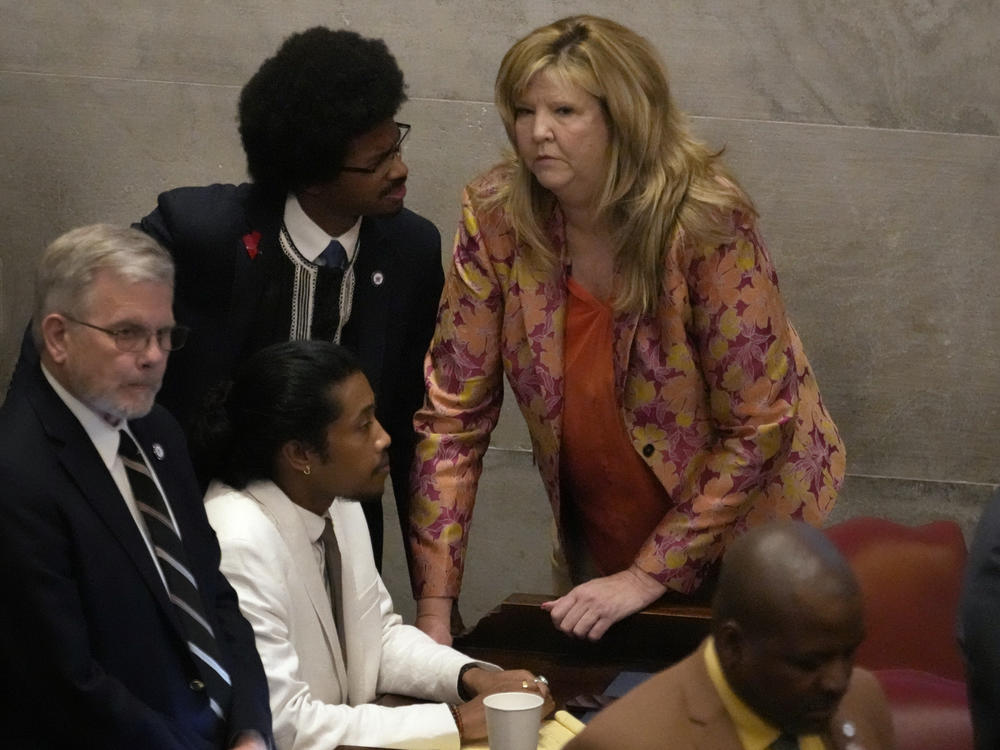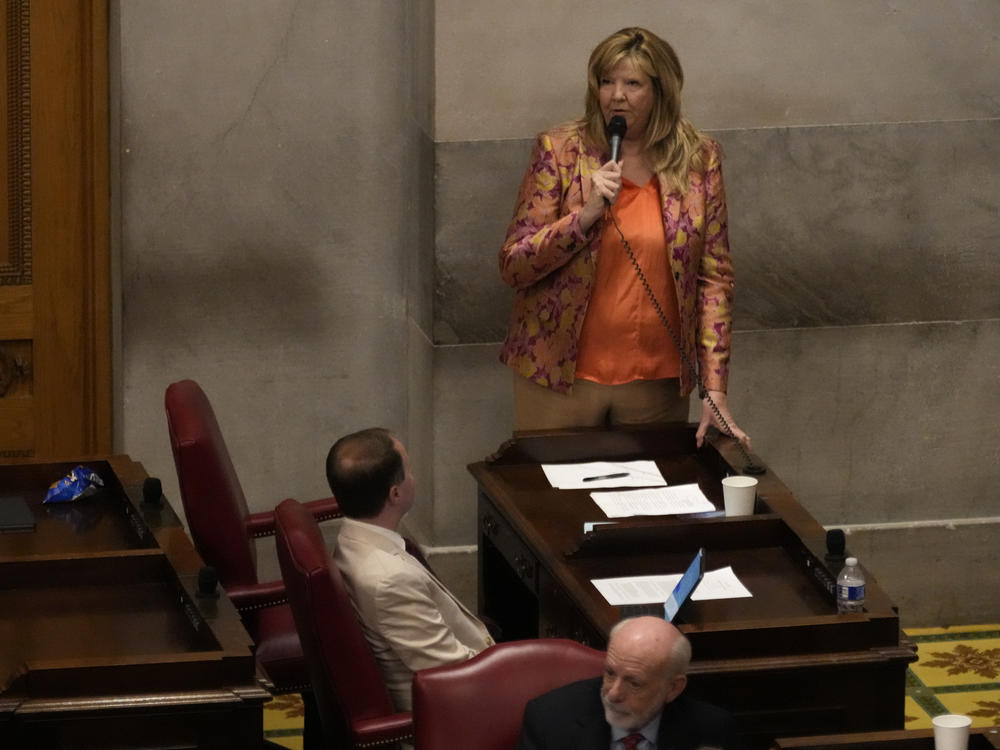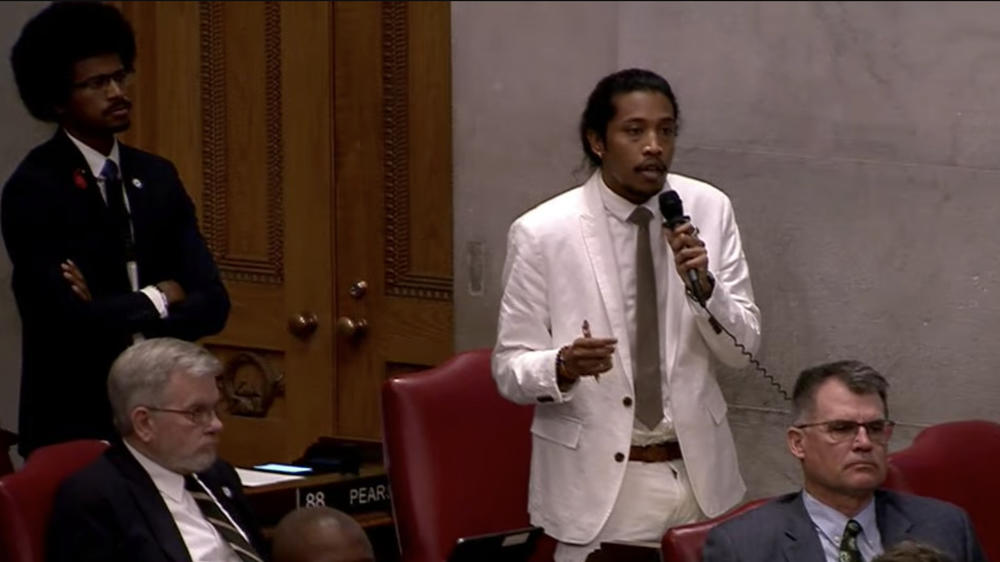Section Branding
Header Content
Tennessee House votes to expel 2 of 3 Democratic members over gun protest
Primary Content
Updated April 6, 2023 at 8:33 PM ET
In an extraordinary move, Tennessee's Republican-led House voted Thursday to expel two of three Democratic lawmakers who recently led a raucous protest from the House floor calling for gun law reforms.
Reps. Justin Jones, D-Nashville, and Justin Pearson, D-Memphis, were both removed from the body with votes falling along party lines, in a disciplinary measure that's only been used twice since the 1800s. The votes were 72 - 25 and 69 - 26 respectively. Together, they represent a combined constituency of about 130,000 people.
Rep. Gloria Johnson, D-Knoxville, who represents about 70,000 Tenneseans, escaped the same fate by a single vote, with a final count of 65 - 30.
Following the failed vote, Johnson was asked by reporters if she thought there was a reason she'd had a different outcome. "I'll answer your question," she said. "It might have to do with the color of our skin."
Both Jones and Pearson are Black and Johnson is white.
The expelled lawmakers conceded they didn't follow decorum by walking on the floor — what is called the well — and speaking without being formally recognized.
Republicans said the trio's actions amounted to an insurrection.
The trio, whom supporters call "The Tennessee Three," have already been stripped of their committee assignments.
Here's more context, and how we got to this point. (You can also follow along with member station WPLN's updates.)
What happened on Thursday?
Lawmakers began to take up the question of expelling three of their colleagues shortly after 1 p.m. local time. During the proceeding, loud protests could occasionally be heard from off the chamber's floor.
A motion was adopted to allow Johnson, Pearson and Jones 20 minutes each to speak on their own behalf, including time for their attorneys.
Jones was the first of the three to address the chamber, offering an explanation for his actions on the well of the floor on March 30.
"The world is watching Tennessee," he said. "What is happening here today is a farce of democracy."
He called the majority Republican membership, many of whom have said they would vote to expel the members, a "lynch mob" that is eager to enact the "ultimate punishment" against himself, Johnson and Pearson.
"I represent 78,000 people and when I came to the well that day I was not standing for myself," Jones said. "I was standing for those young people ... many of whom can't even vote yet. Many of whom are disenfranchised. But all of whom are terrified by the continued trend of mass shooting plaguing our state and plaguing this nation."
Jones also noted the rare instances in which the House or Senate have taken such a drastic measure against a sitting, elected representative.
"This is not a temple. This is a place where we're supposed to wrestle for our democracy and wrestle ideas," Jones added.
An attorney for Johnson, former Rep. John Mark Windle, decried the resolution as an "outright lie" and "an outright distortion of her conduct."
Windle argued that contrary to the motion submitted for her removal of the House, Johnson never shouted or pounded the podium or displayed a sign containing a political statement while she was in the well last week — all of which would be in violation of the House rules.
Windle said expulsion has been reserved for people who take bribes, commit sexual offenses, or for felons.
"She is not a felon, she is not a misdemeanant, she's not a sex offender, she's not a target of a federal grand jury investigation, she's never had a single ethics violation ... simply put she's never broken the public trust," he said.
Speaking in response to questions from a Republican lawmaker, Johnson disagreed that she had shouted from the floor.
"I absolutely never yelled," she said, adding that she "did not speak in voice louder than any other member on this floor."
Later she added: "I may have broken a rule in approaching the well but much of what is in this document is false."
Johnson also spoke about her experience as a teacher during a school shooting at a Knoxville high school in 2008. Although she's now retired, Johnson said that she still spends a lot of time on school campuses and that whenever she hears the cry of police siren or an ambulance, she jumps.
"Every single time because you just never get that out of your head," she said.
Rep. Justin Pearson took a multi-pronged approach to attacking the allegations against him.
First, he argued that as a freshman representative, he has not been made aware of all of the House rules and to what and when they apply.
"I was told that we were crowding around the clerk's desk," he said, referring to the language in the motion against him and his colleagues. "And I gotta be honest with you, I just realized they were talking about this desk and not the one up there," he said pointing to the speaker's desk.
He added: "There's a lot of things that are in these resolutions that seem to assume a lot of knowledge about what I am supposed to know. What we are supposed to know, without real facts about what we have been provided information about."
Pearson also disputed the fact that he and the others disrupted the day's proceedings with their protest.
"I didn't disrupt proceedings between 10:50 to 11:42 because it wouldn't have been possible. We were in a recess," he said.
"None of us believed that we were doing anything that deserved expulsion from the House," he explained, adding that the House rules dictate that a member who violates the rules of decorum should face "censure" and not "expulsion."
Earlier in the proceedings, Rep. Johnny Garrett, the House majority whip, played a seven-minute video of events from that day, over objections of Democrats including Rep. Joe Towns, Jr., D-Memphis, who spoke out against what he called a "stacked deal" and an "ambush."
The video was a compilation of footage from that day and afterward — and because it included video shot on the House floor, Democrats said whichever member had taken the footage had likely violated House rules.
House protest followed Nashville school shooting
The expulsion vote took place one week after Reps. Johnson, Jones and Pearson used a megaphone to lead chants of demonstrators in the House gallery.
Days earlier, a 28-year-old assailant shot and killed six people at an elementary school in Nashville, prompting crowds of students and parents to visit the legislature, urging new controls.
Jones, Pearson and Johnson called out Republican leaders for not responding to the push for gun restrictions in response to the mass-shooting crisis in the U.S. They did so, they said, to amplify the voices of protesters and their constituents.
Hundreds of people came to the Tennessee State Capitol on Thursday to protest the vote and call for gun control, as WPLN's Lexi Marshall reports.
What are the 3 lawmakers saying?
Before the vote, Jones, Pearson and Johnson noted that if they were expelled, more than 200,000 Tennesseans would lose the representatives they lawfully elected last fall.
"We are losing our democracy in Tennessee," Pearson told WPLN. "This is another example of the erosion of democracy because we spoke up for gun reform. Because we spoke up for people and children who will never become state legislators, who will never graduate from high school and never get engaged, never be able to see or protest for their own lives because they've been killed by gun violence."
"This was not an insurrection," Johnson told WPLN. "We've had skirmishes on the floor that have taken this long to resolve, and there were never any consequences."
Jones said on CNN that Republicans are using authoritarian methods to silence the opposition. "It's very concerning and it represents a clear and present danger to democracy all across this nation," Jones said. "That should trouble us all."
It is "morally insane," Jones said, to prioritize punishing lawmakers over a procedural breach after a mass shooting at a school.
What are Republicans saying?
Republicans immediately criticized the three lawmakers for disrupting order and breaking procedural rules in the chamber, in a disruption they say lasted nearly an hour.
House Speaker Cameron Sexton compared the incident to Jan. 6: "What they did today was equivalent, at least equivalent, maybe worse depending on how you look at it, to doing an insurrection in the State Capitol," he said.
Sexton also noted that Jones and Johnson had previously been "very vocal about Jan. 6 and Washington, D.C., about what that was."
The three virtually identical resolutions to expel Jones, Johnson and Pearson accuse them of disorderly behavior that "reflects adversely upon the integrity and dignity" of the House.
What are the House rules around expulsion?
The Tennessee Constitution's Article II, Section 12 empowers the House to "punish its members for disorderly behavior," and to expel members with a two-thirds majority vote.
Jones' and Pearsons' seats will become vacant. Because the 2024 general election is more than 12 months away, their districts will hold special elections to fill the seats. The representatives' county commissions can also choose to appoint an interim lawmaker, who would serve until a special election is held.
Representatives who are expelled can return to their office — by being appointed by the commission and/or by running again. The state constitution also says a lawmaker can't be expelled a second time for the same offense.
Who else has been expelled?
In 2016, state Rep. Jeremy Durham was expelled after being found to have shown "disorderly behavior" — in that case, Durham was facing numerous allegations of sexual misconduct.
Before Durham, the last expelled representative was Rep. Robert Fisher, who was voted out of the chamber in 1980 after being convicted of seeking a bribe in exchange for scuttling a piece of legislation.
"Where does courtesy stop and a bribe begin?" Fisher asked at the time.
Both of the votes to expel Durham and Fisher were overwhelmingly bipartisan.
In early 2022, the Tennessee Senate voted to expel Sen. Katrina Robinson, after she was convicted of wire fraud — "the first time the chamber has removed a senator since at least the Civil War," the Associated Press reported.
Copyright 2023 NPR. To see more, visit https://www.npr.org.





